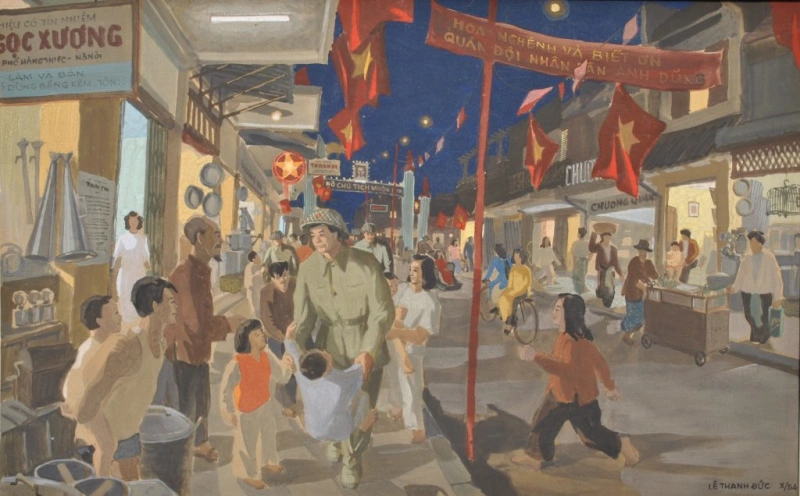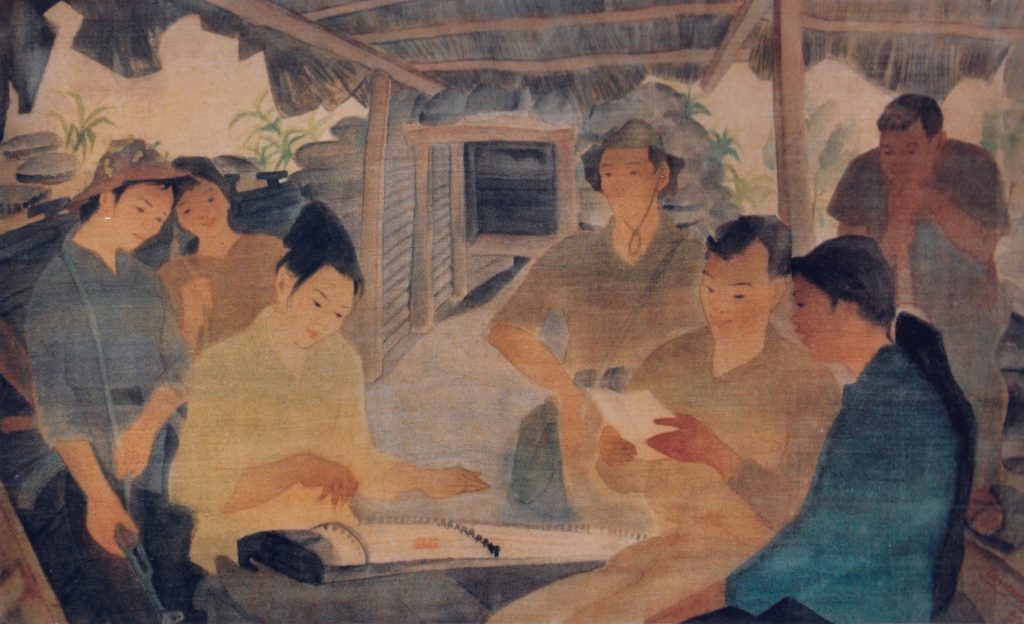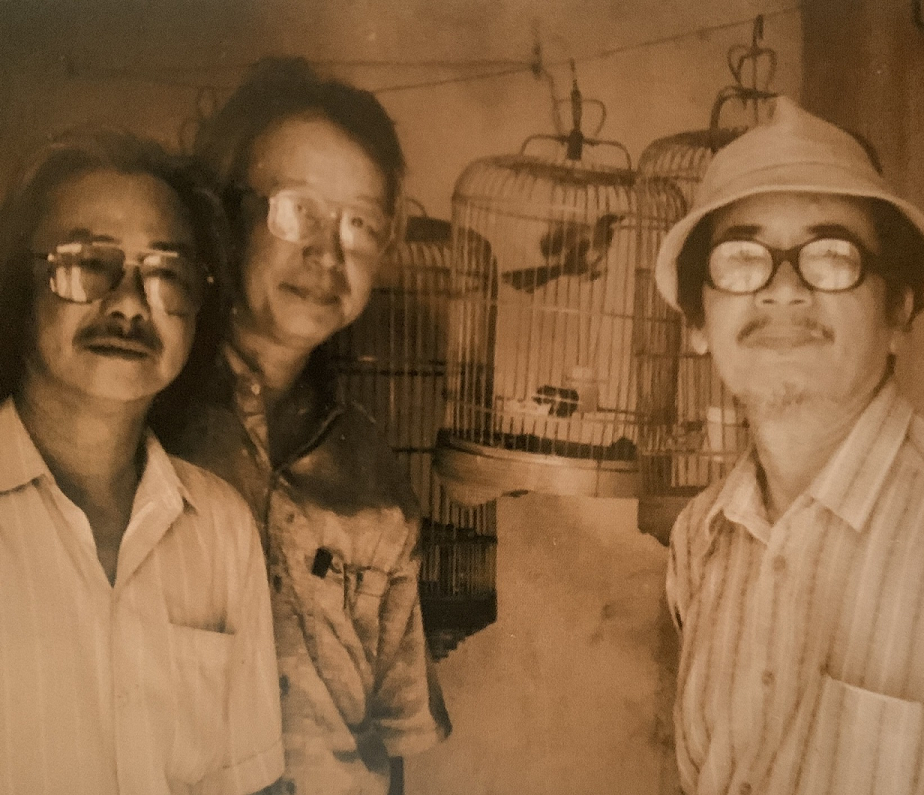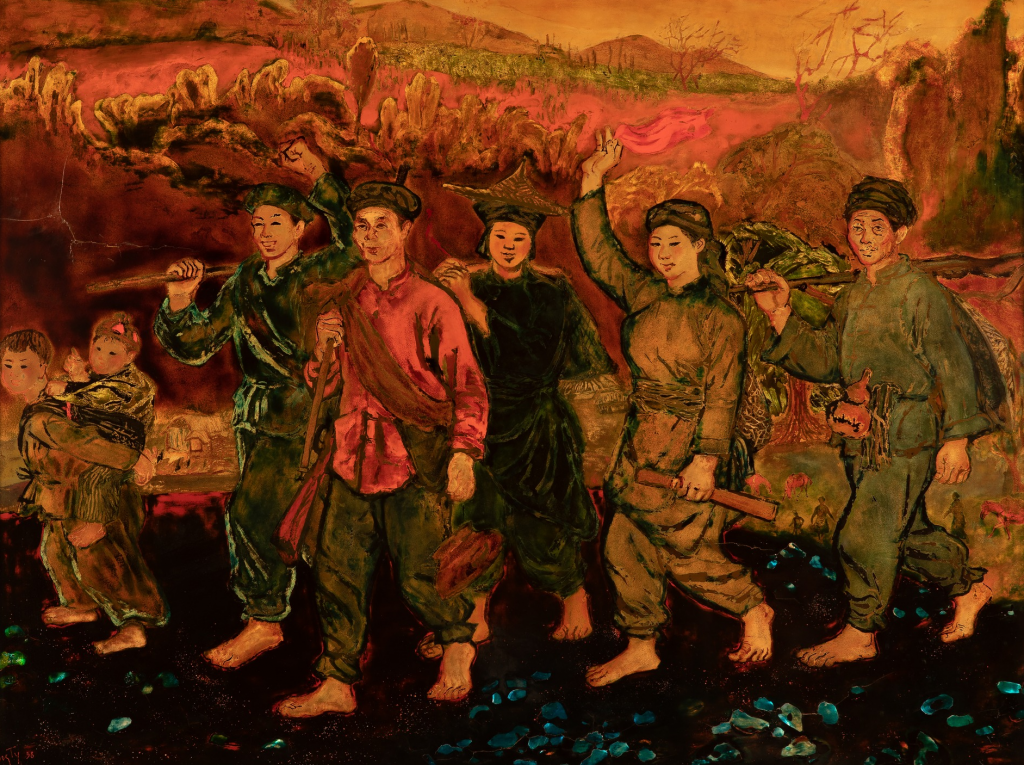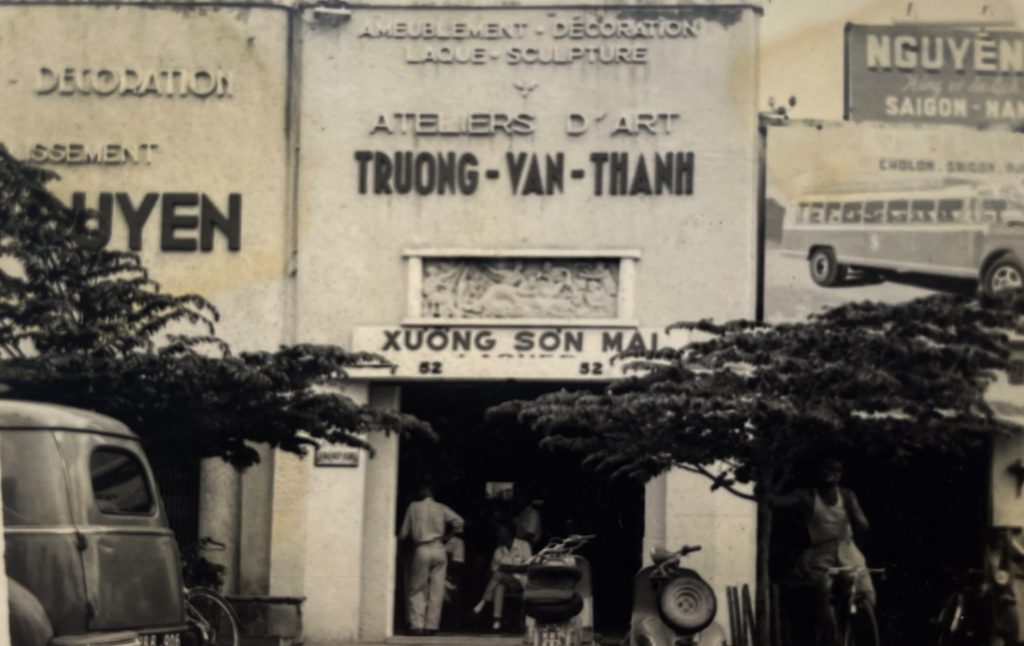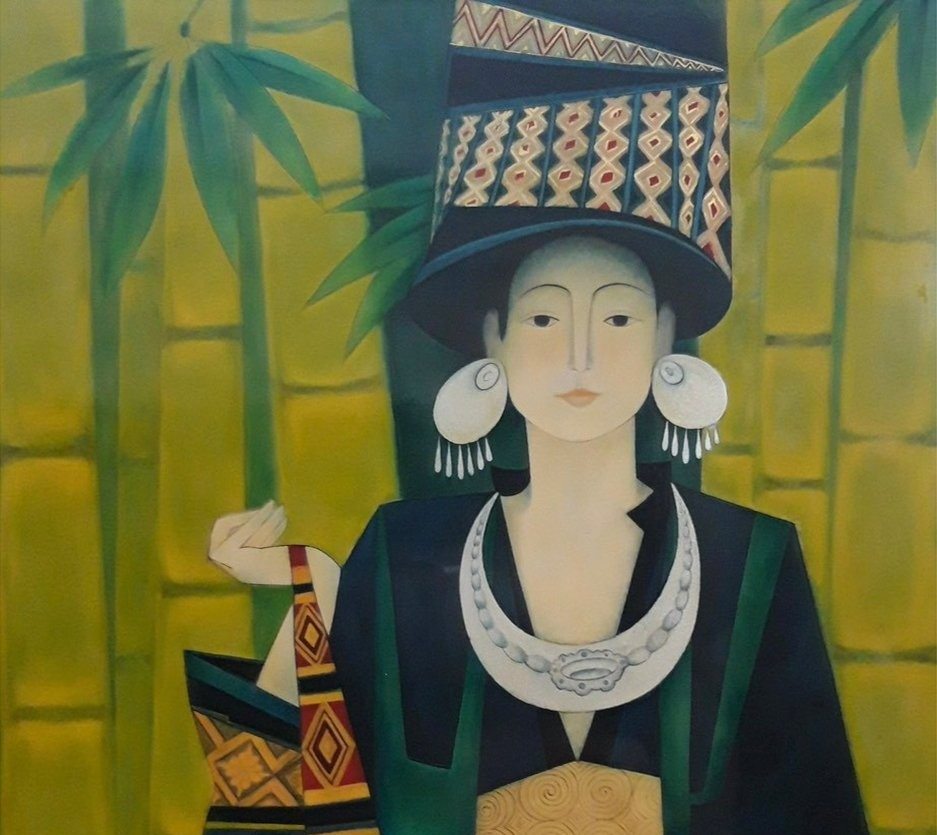In the book ‘Painter Nguyen Phan Chanh’ by Nguyet Tu and Nguyen Phan Canh, Culture Publishing House 1979 is a collection of articles related to the life and career of painter Nguyen Phan Chanh. The writings are very emotional and full of feelings. Viet Art View would like to post a small article. Sincerely introduce to you art lover.
First story
THE FIRST DRAWING INJUSTICES
A curved line down made the back of the fish. A curved line up made the fish’s belly. Three oblique lines in the middle of the fish’s body made the scales. Added a line at the top of the fish’s mouth making a fishing line. It’s done.
The four-year-old baby’s small hand clutched a piece of black coal picked up from the kitchen, drew on the lime wall a hooked fish. Obviously everyone realized.
Little boy Chanh put the coal down, looking at the fish that his hand had just drawn on the white lime background. The fish that his father often brought home. The fish that his mother bought at the market, popping, its scales shining. He imagined that the hooked fish was stuck there, struggled on and on, never get out of the white lime wall.
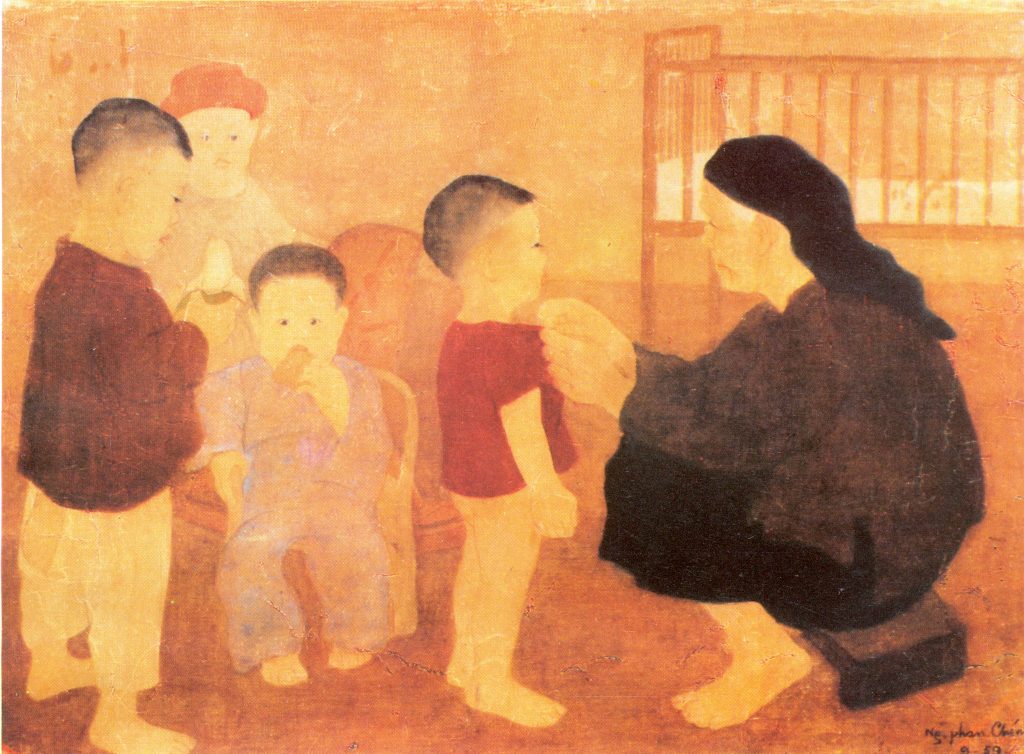
[Nguyen Phan Chanh (1892 – 1984). Children of the cooperative. 1959. Silk. 51×72cm (In the book ‘Silk painting of Nguyen Phan Chanh. 1992. Vietnam Fine Arts Museum.)]
Father went to work. Mother went to the market. Chanh alone played in the yard. Many strange scenes unfolded before his eyes. The patches on the wall, the moss on the water tank, looked like mountains, rivers, bridges, little houses that Chanh had seen somewhere. Yes, that patchy spot, just need to draw a few more lines, paint a few more strokes, it would become a scene of high mountains and tall trees, the military and mandarin climbing on the mountains… which he saw when his father carried him going to watch performances in the inner city. The gate of Cua Tien Ha Tinh, Chanh followed his father in, he could see what an unusually tall arch of the gate. When they were in there, he saw a lot of people surrounding a large patch of land. Chanh clearly remembered that scene of mountains and rivers on the stage, under bright lights. Longingly, when he was being held by his father, stepped in, looking through the dim backs of people, the view of the mountains and rivers and the Prince crossed the river was clearer than when he was sitting in his father’s lap, in the innermost circle. His eyes kept looking up, but in the night watching the play, all he could see was boots and boots running back and forth on the stage…
On the guest house, his father hung four long pictures on the wall. He stood beside the pictures, his head was a little higher than the furniture placed in the middle of the house, he could see more than a half of the picture. Later he still did not know who had painted it, but he liked to look at the image in the picture, ever and ever: a scared baby running into his mother’s lap, a frowning father holding a bamboo stick high. Obviously painting, not print. The raised bamboo branch also had a small green leaf. The painting was simple, the brush strokes were delicate, the colors were not garish.
Although the images of the furniture in the house were hard to imagine, the impression of that picture was forever imprinted in Chanh’s mind. The person who painted it was so subtle, at the angry figure of the father and the gentle face of the mother. As for the boy in the picture, why so similar to him? Just the other day, his father also held up a rattan whip and asked him, his face was very usual but his voice was serious:
– Now there are two trays of the meal. The tray in the upper bed is a brass tray, fine chopsticks but only a mediocre vegetable soup. And the tray in the lower bed is the dirty tray, the bowl was chipped, but there was pork and fish. Ask which table to sit at?
Don’t know if little boy Chanh was afraid of his father’s whip or he really understood that the upper tray was respected more, even if he couldn’t eat pork and fish, then he said:
– Father, I eat at the tray above!
His father smiled and explained further:
– Although the lower tray has delicious meat and fatty fish, it is a lowly place. The upper tray is mediocre with vegetables, but it is a high and respectable tray. You should not be craving for meat and fish, spoiled eating, then forget the noble place, clean dishes and bowls.
Five-year-old Chanh did not understand anything about the noble lesson at that time, but later thought about it and found that his answer to his father was right. He only wondered: Is the boy in the picture asked by his father with a whip like his father asked him?
Little boy Chanh grew up in the love of his grandfather and grandmother, they live in the market street, which Chanh called “market grandpa, market grandma”. His grandfather often held him in the lap, reciting poetry. His grandmother sometimes visited him, forgot the longan in her brown belt.
A few wooden houses his parents had just built by the Tan Giang River. The boats were parked at the waterfront. One day the family performed a Prayer Ceremony, little boy Chanh sat in his grandfather’s lap, seeing the candlelight, the light reflected on the water, the human figures undulating in front of the waterfront, burning votive papers.
His father’s voice sounded loud and resonant when telling his mother:
– His mother arrange clothes for him, I take him to go around.
As soon as he heard his father’s voice, Chanh ran to the back of the house, put his head in a basin of water to wash his face, then washed his hands, ran to his mother to ask for a new clothes and found a little conical hat to put on his head, then ran fast after his father.
On the occasion of the Lunar New Year, little boy Chanh was dressed in a dark shirt, white pants and especially a pair of leather sandals with a curved toe, following his father to wish his grandparents a happy New Year at the market. Many times going out with his father, running after him, so whenever he remembered his father, Chanh immediately remembered his tall figure with a white hat, and his long, straight back most of all. As for his father’s face, he could not imagine in his memory.
Chanh was most fascinated by his father’s papers with rows of circular coins and a stick. Chanh often stayed side by side with his father, watching his father used the wooden stick to tap lightly on the circles with pieces of damp paper on top. Only later, Chanh learned that it was a way to delete wrong numbers while doing calculations. That’s his father’s job.
Little Chanh’s great-grandfather was a poor Confucian, passed the baccalaureate, from Van Thu commune, in the west of Ha Tinh town. He taught in Tien Bat village in Trung Tiet commune, then married the only daughter of the family he stayed to teach. Because the family had no son to inherit, in the next few generations, there was nothing left of the farm property. Baby Chanh often heard his great grandmother, recounted when chewing betel:
– When lương, giáo [two sides of different religions] fight, the genealogical texts were all burned, so the hào lý [dignitaries in the village] did not give mother and children any field, the fields that grandparents still plowed.
Little Chanh knew that only because his father had good handwriting and was good at calculating, the mandarins in the city hired him for measuring field. The first book his father bought for him when he was five years old to study at home was the Tam Tự Kinh [the book with three words each line], the handwriting was equal and straight. In the book there is a sentence: “Thủ hiếu để, Thứ kiến văn” meaning care for your parents first, learning for yourself second with your eyes, ears, then your brain. The text of the first book and his father’s stern voice had a lasting influence throughout Chanh’s life.
What Chanh remembered the most was a little boy, the son of a family, on the way to the capital, who stopped for a few months in Chanh’s house. The image of that friend was inseparable from the memory of the pocket watch the family forgot at his house. The couple and their little son had packed their bags and been on their way for a while, when Chanh entered the house, suddenly saw something round and round, as big as a tangerine and iridescent gold. He quickly took it and ran to the yard to give it to his father, who said:
– Run immediately and give it to the guest. They hurry away, forget the watch!
Three years later, the whole family of the guest went back to Ha Tinh, visited Chanh’s parents, then… things changed. The wooden house were almost empty with the widow and three naive children. Compassionate, they consoled and gave Chanh a small gift as if to remember him and his family three years ago…
[Ho ho…
On either side of the men,
Straighten the rope, the foreman is in!
Ho ho…
On either side of the woman’s side,
Pull the rope straight, the evil man has come in…]
The cheering for pulling the roller was interrupted, heavy, resounding on the bank of the Tan Giang river. Hilarious singing made everyone laugh. The fatigue seemed to be reduced.
The red dirt road along the river to the province was being paved with crushed stone. Little Chanh followed his mother and poor members in the village to the riverbank to pound crushed stone, got wages to buy rice. When he was eight years old, chubby and sturdy, was able to carry medium amount of stones, and dragged them to his mother to pound them, pile them up separately to get wages.
Crushed stone had been spread on the road surface. The two sides of the roller had two long ropes tied to the center of it. Two ropes with bare backs, wearing shorts, ragged, bare feet, each rope had about a few dozen people, the big rope draped over their shoulders, sweat pouring down their faces. They were pulling hard so that the roller moved to press the road surface. The cheers rose, paused, rose again. Two ropes were very tight. The stone roller moved heavy and slow. The men got tired and fell asleep, despite the burning sun. The women, wearing brassière, rolled up their faded brown and patched skirts over their calves, also stood on both sides of the roller, the ropes on their shoulders, hunching their backs to pull. Those aunts were still strong. Chanh could see that. His mother was not strong enough to pull the roller, she just sat and pounded crushed stone, her wages were only half of everyone’s wages.
Suddenly, a tall, dark figure appeared at the top of the road. The foreman was out. Everyone was sitting and resting for a while, hastily got up in fear, huddled next to the roller, and pulled hard. The chanting was silent.
The foreman was an Indian, Chanh found him looked like the Hộ Pháp guarding in front of Trung Tiet village’s communal house. The same fierce face, wild white eyes. There was also a hand-held whip, scary at hell. Seeing the foreman coming up, Chanh quickly moved away, not daring to approach his mother anymore.
Once, passing through the provincial street, seeing Mrs. Xua, the foreman’s wife, sitting in a luxurious mansion, Chanh came home and asked his mother:
– Mom, she is our person, long hair white skin, but marries the evil man, mother?
Mother smiled and replied:
– His body is black but his silver is white.
Chanh only knew that Mr. Xua had a lot of silver, so he was happy. And he could do whatever he wanted. Chanh, like his relatives in Tan Giang hamlet, had no silver, so he had to suffer, had to pull the roller and pound the crushed stone, but still couldn’t eat and dress well.
The blooming flower silver coin, bigger than the hole in a game, had the image of that Western woman, Chanh once saw at the bamboo cot of the woman who did the exchange of money, she sat at the market gate. In the tax collection season, June and July, the Laos wind blew hot as hell, everyone must have that white silver coin to pay for the collecting, so it was very expensive to buy. Chanh’s eyes had seen that each person carrying heavy money could only be exchanged for a few white silver coins.
The path that Chanh carrying books to the teacher’s class ran along the bank of the dug river to the market, which was also the path from home to grandparents’. Yellow dirt road, green grass on both sides. Chanh earned a long piece of bamboo to push as a horse on the way to class.
The Tan Giang River flowing before the house was formerly just a small canal. Every day, the river widened to facilitate the ferrying, rice-carrying boats in the villages to the province to pay taxes. After the dirt road running along the river was paved with stones, the wooden house with a lime wall on which Chanh drew the fish hooked with coal had to be sold. His father died when his younger brother was less than two months old. An earthen-walled hut, two cramped compartments, was erected on the plot of land at the corner of the old garden. The roof of the hut was leaky, every time it rained, their feet stepped on the sloppy floor.
[Meaning: Having a father, the heel is always clean. If the father died, it would be dirty.]
The sound of his mother lulling his sibling was very sad and made Chanh miss his father even more. She didn’t want Chanh to drop out of school and wandered, she bought the second Tam Tự Kinh, which was still new, took Chanh to a teacher who was teaching five or six little students. He lived in a butcher’s house near the market.
One day, a guest in the neighborhood came to visit the class. The visitor asked:
– The student that can read all the lessons in a month, I will reward one hundred pieces of paper and three pens.
The guest wanted to test the students. The whole class looked at each other. It’s not easy to read a whole month’s lesson right away. All the eyes looked timid, afraid. Chanh did not hesitate, stood up immediately:
– Master, let me read.
Chanh read fluently the lessons of the past month which Chanh used to study when keeping his sibling, beside the hammock. The whole class widened their eyes in surprise. The guest gave him the reward.
The teacher told the whole class:
– Student Chanh has difficult family situation, only two ramshackle cottages, no thatching on, no cover under. His mother has to go to all the markets, working hard, near and far. You students who have rich parents with good meals and clothes are lazy and have bad results, why don’t you take student Chanh as an example?
The school was divided into three classes: first, second, third. Chanh was the top of the first grade. Although he was a good student, but he was a poor student, he was not the most beloved student of the teacher. Knowing his situation, Chanh was only concerned with studying, but his heart could not help but feel a pent up frustration.
Every four years, the school organized an exam, with flags and boards, and a prize of confectionery. Chanh was so happy every time he stood up to receive the lovely red bunting flag. The small flag was the joy and also the pride of Chanh against the aggressive and arrogant rich students. Clothes, books, houses, everything was inferior to them. There was only a red bonus flag, so every time Chanh tried to win, must have it.
Several times in a row, Chanh received the flag, the teacher said nothing. But one day, the teacher called Chanh to the yard, while rubbing Chanh’s head, he said softly:
– You got the first many times. This time let Xuan get the first because he is getting married soon.
The teacher’s words made Chanh feel a very pent up anger. Chanh knew that if student Xuan got the top and received the flag, Xuan’s mother would give teachers a big meal. As for the past few times, Chanh got the first place, Chanh’s mother was poor and did not have the money to invite the teachers to a mediocre meal, let alone a big meal.
Chanh tried to hold back and replied to the teacher:
– Sir, Xuan gets married so he does, why I have to stand back?
Chanh’s question was difficult to answer for the teacher, but the first reward at that time was still in the hands of the innkeeper’s son.
In the small garden behind his grandmother’s house, Chanh liked to look at the large bunches of yellow flowers. So beautiful. It was the flower of the tree for seeding, which his grandmother did not allow anyone to pick. Under the sun, the flower clusters were more dazzling yellow. A few strange butterflies, with yellow wings too, flied over the flowers. Yellow butterfly wings mixed with yellow flowers. Butterflies perched on flowers, he was unable to distinguish between flowers and butterflies.
Chanh was engrossed in looking at butterflies and flowers when his grandfather’s loud voice startled him:
– Chanh! The teacher sends student Ba to call you to his house, he wants to ask you something.
– I know, grandpa. If I come, I will be hit. The owner of the house blames me unjustly that I instigated the students to knock down the curtains of the owner’s house and then asked my friends to drop out of school.
The gentle grandfather finished smoking a pipe, slowly said to his grandson:
– You go to tell the teacher clearly, he won’t hit you.
Chanh listened to him, then followed Ba to the teacher’s house. Afraid of the whip, Chanh crept out of the gate. The teacher knew that Chanh had come, and in the house shouted loudly:
– Ba, why you keep him out there so long?
Chanh knew it wasn’t fine, so he ventured in. As soon as he saw the teacher lying down looking at the book, Chanh didn’t have time to say “sir”, he saw the teacher sitting up, shouting Ba to catch him. Ba was afraid of his friend, still hesitant. The teacher immediately grabbed the whip that was still on the box next to the table and jumped to the ground. Chanh was so scared, he ran home. So he dropped out of school for the second time.
Father passed away, it took a very long time for him to go to school. After studying for a few years, he dropped out twice. Last time, just because he lost a book, his mother did not have the money to buy another one right away. This time, because the owner of the house did not like his mother, who was poor but still wanted her child come to study at his house, so he made up a story. In order to win the favor of the homeowner, the teacher did not need to care about the child’s self-esteem. Reason belongs to the powerful. Chanh couldn’t go to school to let them despise and bully him like that.
Time, years went by, but Chanh couldn’t go to school any more. In the afternoon, going out to stand in front of the house, Chanh watched his friends going home with books, felt very hungry to study. Chanh borrowed books, self-studied. But every time he took care of his siblings for his mother to go to the market, Chanh couldn’t help but watched the wasp flying back and forth to make a nest countless times. It’s going to be a storm. Chanh looked at the swarm of black ants going continuously away.
(Excerpt from the book ‘Painter Nguyen Phan Chanh’ by Nguyet Tu – Nguyen Phan Canh, Culture Publishing House, published in 1979)


